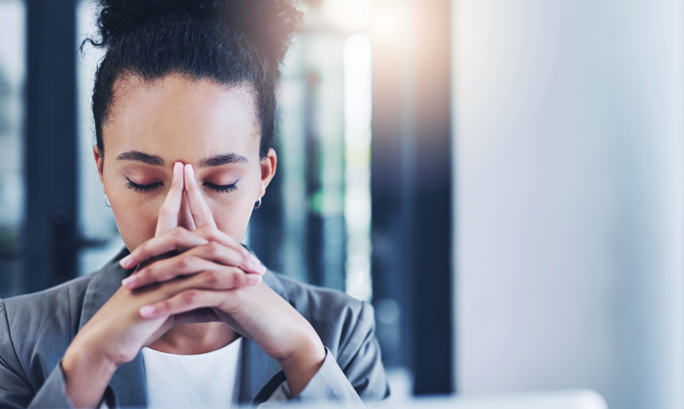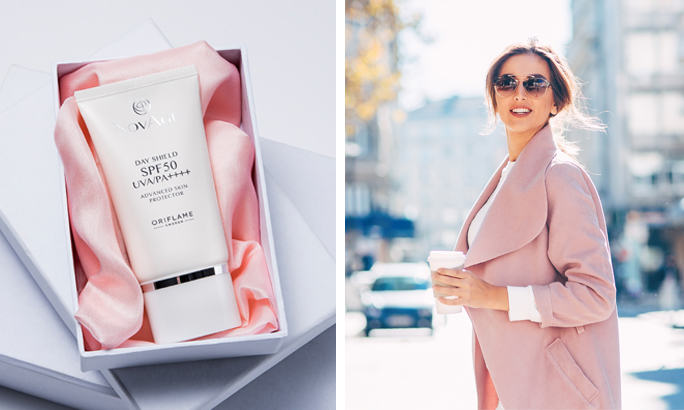Whether it’s virtual meetings, doing more shopping online, or watching more Netflix than ever, one constant is true: we’re spending a lot more time in front of our screens – our main source of artificial blue light - than we used to. And while they’ve helped us navigate the logistics of work, school, and social life during COVID-19, it’s time to ask the question: what are the effects of too much screen time? Turns out, there’s a lot of misconceptions when it comes to how much blue light our screens actually emit – and how this affects us. “Blue light needs to be taken seriously in terms of a holistic approach to our health,” says Oriflame’s Senior Claims Scientist Capucine Martin-Phipps.
Here’s the surprising truth about screen time - and how to protect yourself.

1. Most Blue Light Doesn’t Come From Your Screen
Contrary to the rumours, the blue light coming from your mobile phone, tablet, TV or computer screen is emitted with a very low intensity. The biggest source of blue light is actually sunlight, as its intensity is much higher (something like 200 times higher!!).
All those rays flooding down from the sky are comprised of a rainbow spectrum of colours, ranging from invisible ultra-violet (UV) light on one end, to infra-red on the other – and blue light is one component of this ‘visible light’. Think of it this way: “If you’re 30cm from a huge bonfire, the heat that you will feel would almost burn you. Compare that to a candle or a match – 30cm from a candle or a match you won’t feel even the heat from that,” says Martin-Phipps. “So it’s a little bit the same to compare the blue light intensity from screens – even powerful ones – to what you would get from visible light or blue light from the sun.” So while you absolutely do need to protect your skin from blue light – it’s the blue light from the sun – not your screen – that’s dangerous. “The goal is to protect from more than just UV rays (from the sun) because visible and infra-red light have been proven to have an impact as well (on skin),” says Martin-Phipps. “But this is coming from the sun not screens.”
2. Blue Light From Your Screens Isn’t Actually Bad For Your Skin
Yes, you read that right. Forget everything you know about blue light damaging your skin. Forget wearing sunscreen while working in front of your laptop (unless you’re outside or by a window with direct sun!)
“If you’re not exposed to direct sunlight indoors there is no scientific proof to date you need to wear a sunscreen,” says Martin-Phipps. “Probably there is an indirect impact from standing in front of a screen and getting tired and getting stressed – and there is certainly an impact on your skin from stress. But if you remove all that and you stand in front of your screen for 24 hours with your eyes closed, there’s a great chance your skin is not going to be directly impacted.”
So, the most important thing to note is your overall lifestyle. If your screen time is affecting how much (or how little) exercise you get or if you’re mindlessly eating crisps while in front of the TV, that’s the bigger issue.
“Standing in front of a screen - be it your laptop or phone - means that you probably don’t exercise or move as much… but the effect of screen light on skin directly is not today proven to be a concern. It does not readily induce or worsen pigmentation,” concludes Martin-Phipps.
3. It’s The Enemy Of Sleep
Finding it hard to nod off? Not surprising, because blue light is a known disruptor of sleep. ”The biggest concern with blue light from a health perspective is that it upsets your internal clock and it tells your brain that it’s actually daylight even if it’s night,” says Martin-Phipps.
Due to our elevated sensitivity to blue light, it has the annoying ability to interfere with our circadian rhythm (the internal clock responsible for periods of sleepiness and alertness). Naturally, all of us are different and some may be less affected, however there is strong evidence to suggest that surfing on your phone or watching TV right before bed can mess with our circadian clock.
Why does circadian rhythm matter? Disrupting your internal clock can have major impact on your health and wellbeing and has been known to be associated with serious health disorders. Experts recommend switching off at least 30 minutes before your intended bedtime.
4. It Tests Your Eyes
Amidst all the negative press, there are some upsides to blue light. Most notably, it’s been shown to boost alertness, help memory and cognitive functions and even elevate your mood. What’s more, exposure to blue light during the day helps your body maintain a healthy circadian rhythm. So get out there and enjoy the daylight while you can – even if it’s just a short walk during lunch.
5. Blue Light Can Be Beaten!
Last, but not least… and yes, this may sound crazy… you could (and probably should) limit your screen time! Cut back and you could save your youthful skin and eyes in the long run, not to mention get a better night’s sleep.




